投资学期末试题库答案和分析(一)
- 格式:doc
- 大小:81.26 KB
- 文档页数:19
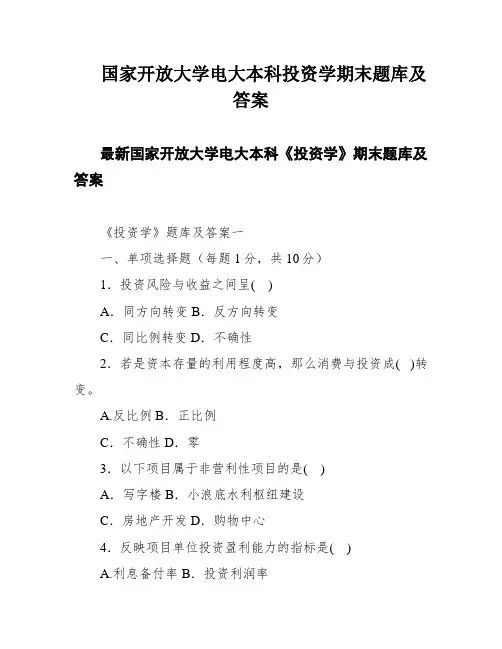
国家开放大学电大本科投资学期末题库及答案最新国家开放大学电大本科《投资学》期末题库及答案《投资学》题库及答案一一、单项选择题(每题1分,共10分)1.投资风险与收益之间呈( )A.同方向转变B.反方向转变C.同比例转变D.不确性2.若是资本存量的利用程度高,那么消费与投资成( )转变。
A.反比例B.正比例C.不确性D.零3.以下项目属于非营利性项目的是( )A.写字楼B.小浪底水利枢纽建设C.房地产开发D.购物中心4.反映项目单位投资盈利能力的指标是( )A.利息备付率B.投资利润率C.偿债备付率D.基准收益率5.区分融资模式属于项目融资仍是公司融资的重要标志是( )A.融资标的物B.融资单位性质C.债权人对项目借款人的追索形式和程度D.融资的期限6.债券的价值为( )之和。
A.息票利息和面值B.息票利息的现值和面值C.息票利息和面值的现值D.息票利息的现值和面值的现值7.某公司股票每一年分红2元,当前投资股票的必要收益率为10%,该股票的理讲价值为(A.20 B.C.D.258.一样来讲,期权的内在价值( )A.小于或等于1 B.大于或等于1C.大于或等于O D.小于或等于O9.当证券持有期收益率( ),表示投资全数损失。
A.大于O B.等于OC.小于O D.等于-110.关于成功工程,应挑选在成熟期的( )上市。
A.初期B.中期C.后期D.末期二、多项选择题(每题2分,共20分)11.投资的特点有( )A.经济性B.时刻性C.安然性D.收益性E.风险性12.经济周期能够分为( )类型。
A.短周期B.中周期C.中长周期D.长周期E.超长周期13.工程标特性包括有( )A.收益性B.目标性C.一次性D.整体性E.限定性F.系统性14.以下属于非固定收入投资的是( )A.优先股投资B.银行存款C.一般股投资D.基金15.股票的特性有( )A.永久性B.收益性C.流动性D.风险性E.介入性16.基金依照组织形式和法律地位不同能够分为( )A.封闭式基金B.契约型基金C.开放式基金D.公司型基金17.阻碍股票代价的内部因素有( )A.宏观经济因素B.上市公司资产价钱的因素C.行业因素D.投机因素18.期货合约与远期合约的不同的地方在于( )A.期货合约不是标准化合约B.期货合约必需在期货交易所交易C.期货合约是标准化合约D.期货合约投资者必需到期执行合约19.创业投资退出的体式格局有( )A.公布刊行上市B.出售C.股分回购D.清算E.破产20.以下( )是创业投资的特点。
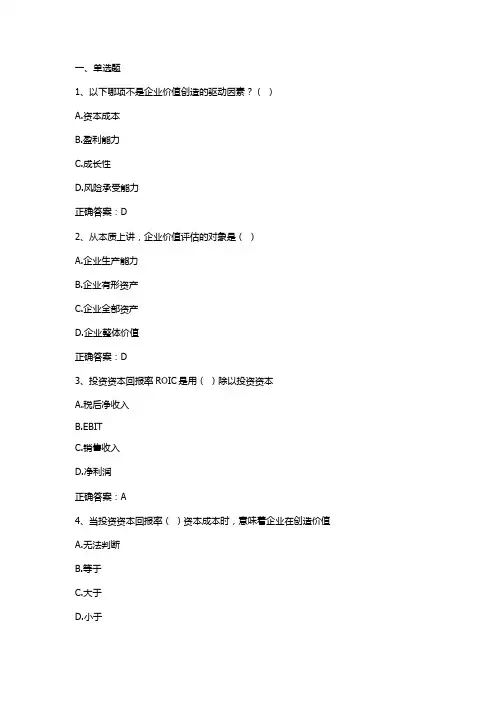
1、以下哪项不是企业价值创造的驱动因素?()A.资本成本B.盈利能力C.成长性D.风险承受能力正确答案:D2、从本质上讲,企业价值评估的对象是()A.企业生产能力B.企业有形资产C.企业全部资产D.企业整体价值正确答案:D3、投资资本回报率ROIC是用()除以投资资本A.税后净收入B.EBITC.销售收入D.净利润正确答案:A4、当投资资本回报率()资本成本时,意味着企业在创造价值A.无法判断B.等于C.大于D.小于5、净资产收益率ROE是用()除以净资产A.净利润B.EBITDAC.EBITD.销售收入正确答案:A6、当净资产收益率 ( )股东要求回报率时,意味着企业盈利能力较差A.无法判断B.大于C.等于D.小于正确答案:D7、在垄断竞争的行业,公司产品差异化程度越大,净利率越()A.无法确定B.高C.不变D.低正确答案:B8、以下哪个市场结构将导致行业进入壁垒最高?()A.完全竞争B.寡头C.垄断竞争D.垄断9、在以下哪个市场结构中,企业的定价能力最弱?()A.垄断B.完全竞争C.垄断竞争D.寡头正确答案:B10、以下哪一行业处于垄断竞争市场?()A.钢铁B.香烟C.大宗商品D.汽车正确答案:C11、某企业流通在外的股票数量为10000股,当前股票价格为4元/股,则该企业的市值为()元A.20000B.30000C.40000D.10000正确答案:C12、某公司2018年获得净利润8000万元,股本总额为2000万股,则该公司当年每股收益为()元/股A.2B.4C.6D.813、一个公司盈利能力的增强反映在()的增加上A.销售收入B.净资产C.净利润D.EBIT正确答案:C14、一个公司资产扩张反映在()的增加上A.净资产B.总资产C.流动性资产D.实收资本正确答案:A15、收益增长速度快,未来发展潜力大,市盈率和市净率通常较高的股票是()A.成长股B.蓝筹股C.绩优股D.红筹股正确答案:A16、经营业绩好,具有稳定且较高现金股利支付的公司股票为()A.成长股B.蓝筹股C.红筹股D.绩优股17、业绩优良且比较稳定,具有较高投资价值的股票是()A.红筹股B.蓝筹股C.成长股D.绩优股正确答案:D18、某公司当前股票价格为300元/股,每股收益为15元/股,则该公司市盈率为()A.50B.30C.20D.10正确答案:C19、股东总回报可以分解成()+ ∆PE + DivA.∆BVPSB.∆EPSC.ROED.G正确答案:B20、以下哪项的变动对股东总回报没有影响?()A.每股收益B.现金股利C.资本公积D.市盈率正确答案:C二、判断题1、公司资本成本WACC的计算方法是用每种资本的成本乘以该资本的账面价值占总资本账面价值的比重正确答案:错2、一个公司的盈利能力只与公司的竞争策略有关正确答案:错3、在经营业绩不变的情况下,企业分红越多增长就越慢正确答案:对4、市盈率可以作为比较不同价格的股票是否被高估或低估的指标正确答案:对5、当构建中长期投资策略时,投资者应更加关注公司估值的提升,而非盈利的增长和分红情况正确答案:错。
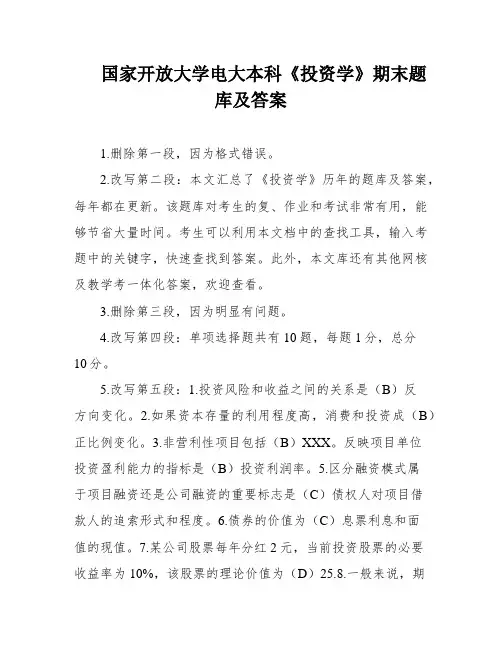
国家开放大学电大本科《投资学》期末题库及答案1.删除第一段,因为格式错误。
2.改写第二段:本文汇总了《投资学》历年的题库及答案,每年都在更新。
该题库对考生的复、作业和考试非常有用,能够节省大量时间。
考生可以利用本文档中的查找工具,输入考题中的关键字,快速查找到答案。
此外,本文库还有其他网核及教学考一体化答案,欢迎查看。
3.删除第三段,因为明显有问题。
4.改写第四段:单项选择题共有10题,每题1分,总分10分。
5.改写第五段:1.投资风险和收益之间的关系是(B)反方向变化。
2.如果资本存量的利用程度高,消费和投资成(B)正比例变化。
3.非营利性项目包括(B)XXX。
反映项目单位投资盈利能力的指标是(B)投资利润率。
5.区分融资模式属于项目融资还是公司融资的重要标志是(C)债权人对项目借款人的追索形式和程度。
6.债券的价值为(C)息票利息和面值的现值。
7.某公司股票每年分红2元,当前投资股票的必要收益率为10%,该股票的理论价值为(D)25.8.一般来说,期权的内在价值(C)大于或等于0.9.当证券持有期收益率(C)小于0,表示投资全部损失。
10.对于成功项目,应选择在成熟期的(C)后期上市。
6.改写第六段:多项选择题共有10题,每题2分,总分20分。
7.改写第七段:11.投资的特征包括经济性、时间性、安全性、收益性和风险性。
12.经济周期可以分为短周期、中周期、中长周期、长周期和超长周期。
13.项目的特点包括收益性、目标性、一次性、整体性、限定性和系统性。
14.非固定收入投资包括股票、期权等。
16.ABCD。
17.ABCD。
18.BC。
19.ABCD。
20.ABCE三、名词解释(每题4分,共20分)21.投资乘数:指投资对国民收入的影响程度,是指国民收入增加1元,投资增加的金额。
22.内部收益率:指使得净现值等于零的折现率,也就是投资项目的收益率。
23.金融期权:是指在未来某个时间点或时间段内,以特定价格买入或卖出某种金融资产的权利。
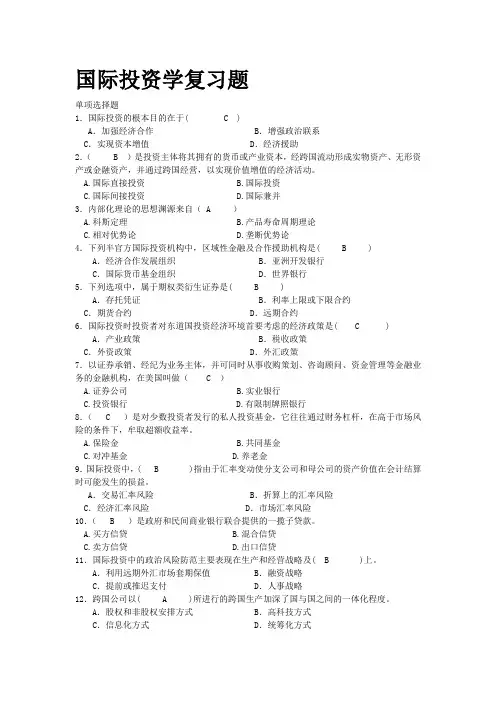
国际投资学复习题单项选择题1.国际投资的根本目的在于( C )A.加强经济合作 B.增强政治联系C.实现资本增值 D.经济援助2.( B )是投资主体将其拥有的货币或产业资本,经跨国流动形成实物资产、无形资产或金融资产,并通过跨国经营,以实现价值增值的经济活动。
A.国际直接投资B.国际投资C.国际间接投资D.国际兼并3.内部化理论的思想渊源来自( A )A.科斯定理B.产品寿命周期理论C.相对优势论D.垄断优势论4.下列半官方国际投资机构中,区域性金融及合作援助机构是( B ) A.经济合作发展组织 B.亚洲开发银行C.国际货币基金组织 D.世界银行5.下列选项中,属于期权类衍生证券是( B )A.存托凭证 B.利率上限或下限合约C.期货合约 D.远期合约6.国际投资时投资者对东道国投资经济环境首要考虑的经济政策是( C ) A.产业政策 B.税收政策C.外资政策 D.外汇政策7.以证券承销、经纪为业务主体,并可同时从事收购策划、咨询顾问、资金管理等金融业务的金融机构,在美国叫做( C )A.证券公司B.实业银行C.投资银行D.有限制牌照银行8.( C )是对少数投资者发行的私人投资基金,它往往通过财务杠杆,在高于市场风险的条件下,牟取超额收益率。
A.保险金B.共同基金C.对冲基金D.养老金9.国际投资中,( B )指由于汇率变动使分支公司和母公司的资产价值在会计结算时可能发生的损益。
A.交易汇率风险 B.折算上的汇率风险C.经济汇率风险 D.市场汇率风险10.( B )是政府和民间商业银行联合提供的一揽子贷款。
A.买方信贷B.混合信贷C.卖方信贷D.出口信贷11.国际投资中的政治风险防范主要表现在生产和经营战略及( B )上。
A.利用远期外汇市场套期保值 B.融资战略C.提前或推迟支付 D.人事战略12.跨国公司以( A )所进行的跨国生产加深了国与国之间的一体化程度。
A.股权和非股权安排方式 B.高科技方式C.信息化方式 D.统筹化方式13.政府贷款是期限长、利率低、优惠性贷款,贷款期限可长达( D )。
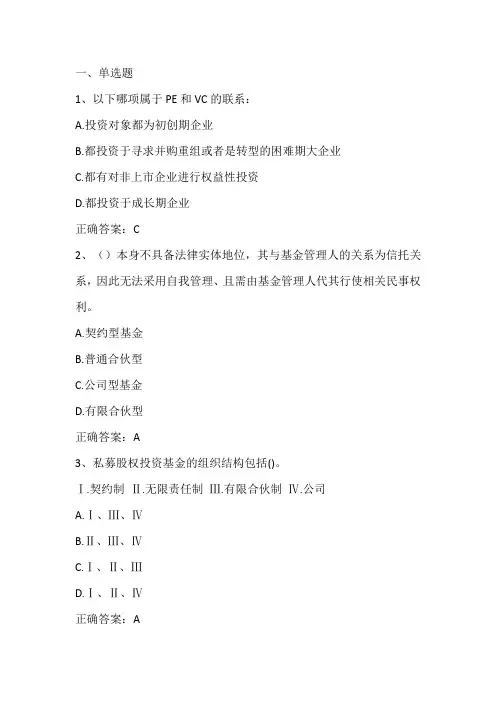
一、单选题1、以下哪项属于PE和VC的联系:A.投资对象都为初创期企业B.都投资于寻求并购重组或者是转型的困难期大企业C.都有对非上市企业进行权益性投资D.都投资于成长期企业正确答案:C2、()本身不具备法律实体地位,其与基金管理人的关系为信托关系,因此无法采用自我管理、且需由基金管理人代其行使相关民事权利。
A.契约型基金B.普通合伙型C.公司型基金D.有限合伙型正确答案:A3、私募股权投资基金的组织结构包括()。
Ⅰ.契约制Ⅱ.无限责任制Ⅲ.有限合伙制Ⅳ.公司A.Ⅰ、Ⅲ、ⅣB.Ⅱ、Ⅲ、ⅣC.Ⅰ、Ⅱ、ⅢD.Ⅰ、Ⅱ、Ⅳ正确答案:A4、股权投资基金投资者是()。
A.基金的出资人B.基金投资回报的受益人C.基金资产的所有者D.以上都是正确答案:D5、股权投资行业主要用到的估值方法为()。
A.相对估值法、折现现金流估值法、创业投资估值法B.相对估值法、清算价值法和相对估值法C.经济增加值法和清算价值法D.折现现金流估值法、经济增加值法和成本法正确答案:A6、关于股权投资基金尽职调查报告的说法,错误的是()。
A.前言部分主要阐述尽职调查的目标、方法、依据、程序和范围B.正文是尽职调查报告呈现内容的主体C.各股权投资基金的尽职调查报告的格式、内容要求基本相同D.尽职调查报告是投资决策的重要参考和依据正确答案:C7、以下不属于股权投资基金业务尽职调查目的的是()。
A.了解现在企业创造价值的机制B.识别企业各项业务的风险集中度C.了解过去企业创造价值的机制D.了解企业创造价值机制未来的变化趋势正确答案:B8、尽职调查的范围包括:A.以上都是B.财务尽职调查C.法务尽职调查D.业务尽职调查正确答案:A9、股权投资的流程中,初步尽职调查的核心是()。
A.详尽调查B.投资风险评估C.项目立项D.对拟投资项目进行价值判断正确答案:D10、对于合伙型基金而言,基金的投资者以()的身份存在,()对合伙企业的债务承担无限连带责任。
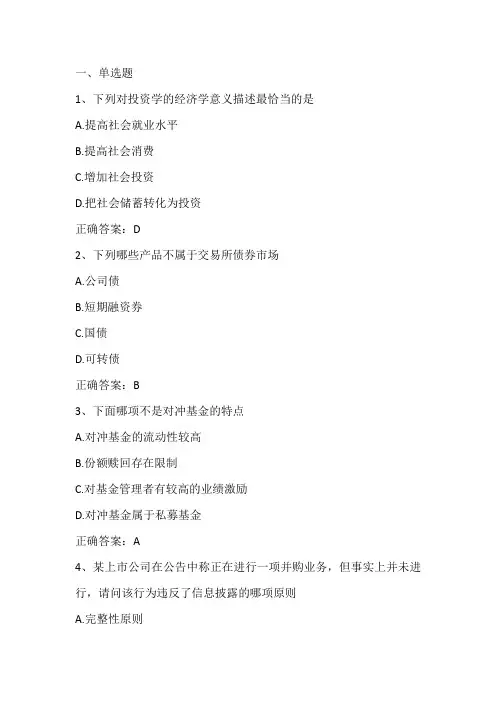
一、单选题1、下列对投资学的经济学意义描述最恰当的是A.提高社会就业水平B.提高社会消费C.增加社会投资D.把社会储蓄转化为投资正确答案:D2、下列哪些产品不属于交易所债券市场A.公司债B.短期融资券C.国债D.可转债正确答案:B3、下面哪项不是对冲基金的特点A.对冲基金的流动性较高B.份额赎回存在限制C.对基金管理者有较高的业绩激励D.对冲基金属于私募基金正确答案:A4、某上市公司在公告中称正在进行一项并购业务,但事实上并未进行,请问该行为违反了信息披露的哪项原则A.完整性原则B.及时性原则C.真实性原则D.准确性原则正确答案:C5、张三申买的价格与李四相同,但是申买的时间早,所以张三比李四先买到了股票,这体现了下列原则中的哪一个原则A.价格优先B.机构优先C.数量优先D.时间优先正确答案:D6、下面哪个证券市场采用了做市商制度A.我国A股市场B.我国创业板市场C.纳斯达克市场D.纽约证券交易市场正确答案:C7、市场开盘集合竞价的订单申报情况如下:买方委托:10.02申买50手10.01申买100手9.99申买200手9.98申买300手9.98以下的申买信息省略卖方委托:9.98申卖50手9.99申卖100手10.01申卖200手10.02申卖300手10.02以上的申卖信息省略。
基于上述申报信息,成交价应划为B. 10.01C. 10.00D. 9.98正确答案:C8、为了规避现货市场风险所进行的期货交易称作()策略A.操纵B.投机C.套利D.套期保值正确答案:D9、假设市场贴现利率为5%(年利率),1年后的1万元现在值多少A. 0.95万B. 0.90万C. 1万D. 1.05万正确答案:A10、假设某公司下一期每股盈利为2元/股,再投资回报率为20%,并且50%的红利用于再投资针对该公司的贴现利率为12.5%,如果该公司把红利再投资率改为60%,则股票的价格升值多少A. 100元B. 120元D. 40元正确答案:C11、产品已被接受,销售额和利润正加速增长属于行业生命期中的哪个阶段A.衰退期B.稳定期C.初创期D.成长期正确答案:D12、根据行业间经济周期敏感性的差异,在经济衰退的阶段表现最好(下跌最少)的行业是A.耐用消费B.能源C.医疗D.金融正确答案:C13、1年期贴现债券的面值为100元,价格为95元两年期债券的面值为100元,每年付息10元,售价为98元根据上述信息计算1年期的即期利率为A. 11%B. 7%D. 9%正确答案:C14、永久债券的到期收益率为5%,则计算永久债券的久期为A. 21B. 11C. 16D. 8正确答案:A15、市场对股市的预期为:上涨概率30%,上涨幅度为20%,下跌概率为20%,下跌幅度为-15%,另外50%的概率保持不变,则计算股市的预期收益率为A. 10%B. 3%C. 5%D. -1%正确答案:B16、在孤岛经济中当阴雨季节来临时,雨伞公司利润40%,旅游公司利润-10%当晴朗季节来临时,雨伞公司利润-20%,旅游公司利润30%假设阴雨季节与晴朗季节发生的概率各50%,则两家公司各投资50%策略的预期收益是A. 12.5%C. 20%D. 15%正确答案:B17、投资者在风险资产选择上的市场均衡条件是A.每个风险资产1单位系统性风险带来的超额收益都相等B.每个风险资产或资产组合1单位系统性风险带来的超额收益都相等C.每个风险资产的超额收益都相等D.每个风险资产1单位风险带来的超额收益都相等正确答案:B18、下面哪个表达式度量了证券i的系统性风险大小A.βB.σiC. βσmD. σm正确答案:C19、学者对“坏周一效应”的合理解释是A.周末披露的坏消息多于好消息B.周一上班情绪低落C.周一公司业绩不好D.宏观数据往往周一披露正确答案:A二、多选题1、关于股票的概念描述正确的是A.证明持有人的股东身份B.可以获得分红C.股份有限公司发行的D.代表公司对股东的债务正确答案:A、B、C2、对于股权分置改革中非流通股股东支付对价的原因说法合理的是A.补偿流通股股东较高的持股成本B.补偿非流通股股东对流通股股东所造成的损害C.补偿流通股股东过去的投资损失D.补偿市场扩容对流通股价格的潜在影响正确答案:A、D3、常见的公司债券有哪些类型A.长期债券B.浮动利率债券C.固定利率债券D.短期债券正确答案:A、B、C、D4、下列对封闭式基金的说法正确的是A.封闭式基金发行总额固定B.在封闭期不接受赎回C.封闭式基金没有明确的封闭期限D.其份额可以在二级市场上流通正确答案:A、B、D5、上市公司按照要求披露年报属于那种类型的披露A.交易期间信息披露B.定期性信息披露C.临时性信息披露D.发行期间信息披露正确答案:A、B6、关于集合竞价成交价的确定原则说法正确的是A.与该价格相同的买方或卖方至少有一方全部成交B.高于该价格的买入申报与低于该价格的卖出申报全部成交C.如果两个以上价格符合上述条件的,取在该价格以上的买入申报累计数量与在该价格以下的卖出申报累计数量之差最小的价格为成交价D.实现最大成交量正确答案:A、B、C、D7、以申买为例,对于连续竞价下的成交原则说法正确是A.如果申买价格高于市场上的最低卖价,则以申报价格成交B.如果申买价格高于市场上的最低卖价,则以最低卖价成交C.如果申买价格等于市场上的最低卖价,则该价格即为成交价D.如果申买价格低于市场上的最低卖价,则交易无法达成正确答案:B、C、D8、市场流动性受下列哪些因素的影响A.市场制度B.信息不对称C.投资者结构D.订单处理成本正确答案:A、B、C、D9、T+1交易制度可能有哪些负面影响A.降低市场流动性B.增加市场波动C.降低跨市场交易的效率D.避免过度投机正确答案:A、B、C10、下列哪些项是停牌或指数熔断制度的正面作用A.降低市场流动性B.降低信息不对称带来的影响C.降低价格过度波动D.降低市场交易量正确答案:B、C11、导致我国融资金额远远超过融券金额的原因有哪些A.融券风险高于融资风险B.融资利息低于融券利息C.融券业务受到券源不足的限制D.相比于融券投资者更喜欢融资正确答案:A、B、C、D12、关于询价制度的说法正确的是A.对不参与询价的机构投资者实施一定的惩罚B.询价对象以机构投资者为主C.询价对象以散户为主D.询价制度是为了更好的了解市场需求正确答案:A、B、D13、根据固定增长红利贴现模型,关于股票价值的影响因素说法正确的是A.如果红利增长速度超过贴现利率则股票价值为负B.红利增长率越高股票价值越大C.市场利率越高股票价值越大D.股票风险越高股票价值越小正确答案:B、D14、按照证券分析师的业绩预测误差对股票进行分组,发现分析师预测低于实际业绩的股票组合具有超额收益,而分析师预测高于实际业绩的股票组合具有负的超额收益,这说明A.分析师的预测往往与真实业绩相反B.根据分析师的预测进行反向操作理论上可以获得超额收益C.市场会对未预料到的业绩变化做出修正D.证券分析师的预测对市场有一定影响正确答案:B、C、D15、关于行为估值理念的说法正确的是A.投资者的行为符合理性预期B.投资者更多地关注公司的长期业绩C.投资者更多地关注市场趋势D.投资者在决策时并非完全理性正确答案:C、D16、关于物价变化与股票价格变化的关系说法正确的是A.未预料到的物价变化对股价影响更大B.通货紧缩会导致股市不景气C.恶性通货膨胀会导致市场下跌D.温和的通货膨胀有助于股价上涨正确答案:A、B、C、D17、关于理论分析与实证检验关系的说法正确的是A.两者结论相悖时需要做进一步的分析B.实证检验以理论分析为指导C.理论分析以实证检验为判别准绳D.两者结论相吻合时比较可靠正确答案:A、B、C、D18、用来界定价值股与增长股的财务指标通常有哪些A.账面资产B.盈利C.分红D.经营现金流正确答案:A、B、C、D19、关于支撑与阻力的说法正确的是A.过去的最高价形成压力线B.过去的最低价形成支撑线C.上升趋势线形成价格支撑D.下降趋势线形成价格阻力正确答案:A、B、C、D20、关于到期收益率的概念说法正确的是A.到期收益率就是债券一直持有到期所带来的回报率B.本金与利息使用到期收益率计算的现值之和刚好等于当前的价格C.未到期的债券无法计算到期收益率D.未持有到期中间换手的债券无法计算到期收益率正确答案:A、B、D三、判断题1、股票融资通过证券公司的投行业务完成,因此也属于间接金融正确答案:×2、由于新股上市日与发行日之间的时间间隔所导致的股价变化不应该计入IPO抑价率正确答案:√3、息票率高的债券风险的低的原因在于其资金回收快正确答案:√4、“投资有风险,入市需谨慎”中的风险主要是指招致损失的可能性正确答案:√5、通过GDP变化趋势的研判就能够把握股市的主要走势正确答案:×6、我国自2016年1月1日起实施了指数熔断制度直至现在正确答案:×7、央行买入政府债券的目的是为了注销流通在外的政府债券正确答案:×8、联合检验指的是超额收益的认定需要借助于一定的理论定价模型正确答案:√9、公司特征对股票收益有预测能力不一定能够证明市场是弱无效的正确答案:√10、在信息披露问题上无商业秘密可言,任何信息都应该向投资者披露正确答案:×。
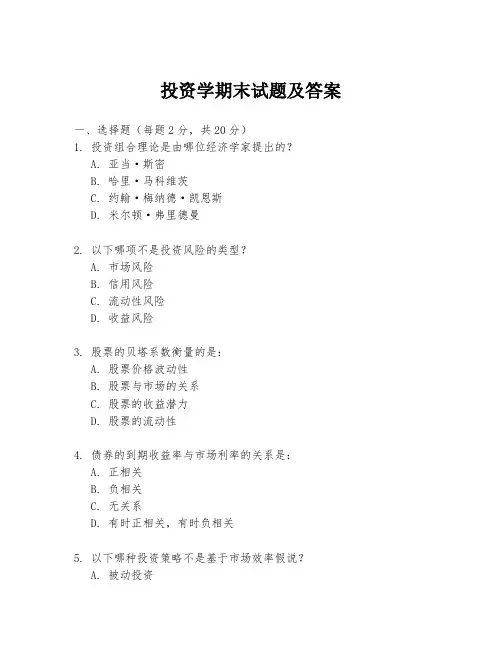
投资学期末试题及答案一、选择题(每题2分,共20分)1. 投资组合理论是由哪位经济学家提出的?A. 亚当·斯密B. 哈里·马科维茨C. 约翰·梅纳德·凯恩斯D. 米尔顿·弗里德曼2. 以下哪项不是投资风险的类型?A. 市场风险B. 信用风险C. 流动性风险D. 收益风险3. 股票的贝塔系数衡量的是:A. 股票价格波动性B. 股票与市场的关系C. 股票的收益潜力D. 股票的流动性4. 债券的到期收益率与市场利率的关系是:A. 正相关B. 负相关C. 无关系D. 有时正相关,有时负相关5. 以下哪种投资策略不是基于市场效率假说?A. 被动投资B. 技术分析C. 基本面分析D. 指数基金投资二、简答题(每题10分,共30分)1. 请简述资本资产定价模型(CAPM)的基本假设和公式。
2. 什么是有效市场假说(EMH)?它对投资者的决策有何影响?3. 请解释什么是杠杆收购(LBO)以及它在投资中的作用。
三、计算题(每题25分,共50分)1. 假设你拥有一个包含两种股票的投资组合,股票A和股票B。
股票A的预期收益率为12%,股票B的预期收益率为15%。
如果股票A占投资组合的60%,股票B占40%,计算投资组合的预期收益率。
2. 某公司发行了一张面值为1000美元,期限为10年,年利率为5%的债券。
如果市场利率为6%,计算该债券的当前价格。
四、论述题(共30分)1. 论述私募股权投资与公开市场投资的主要区别,并分析它们各自的优点和局限性。
2. 请结合当前市场环境,讨论投资者如何平衡风险与回报。
答案:一、选择题1. B2. D3. B4. A5. B二、简答题1. 资本资产定价模型(CAPM)的基本假设包括:市场是有效的,投资者是理性的,不存在交易成本和税收,投资者可以无限制地借贷资金等。
CAPM的公式为:E(Ri) = Rf + βi * (E(Rm) - Rf),其中E(Ri)是资产i的预期收益率,Rf是无风险利率,βi是资产i的贝塔系数,E(Rm)是市场组合的预期收益率。
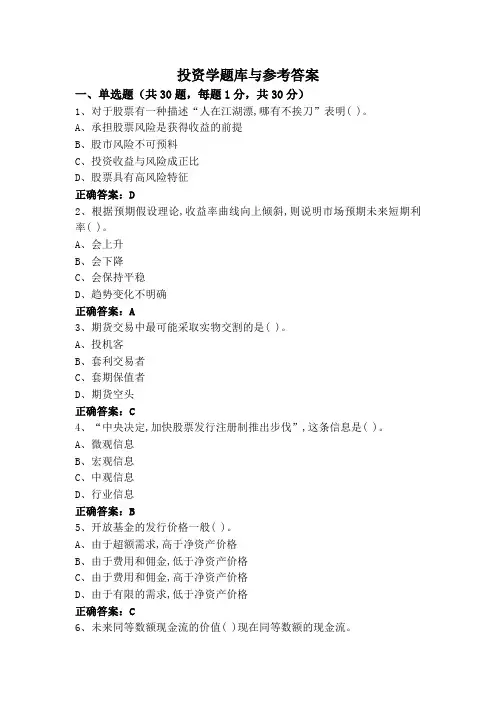
投资学题库与参考答案一、单选题(共30题,每题1分,共30分)1、对于股票有一种描述“人在江湖漂,哪有不挨刀”表明( )。
A、承担股票风险是获得收益的前提B、股市风险不可预料C、投资收益与风险成正比D、股票具有高风险特征正确答案:D2、根据预期假设理论,收益率曲线向上倾斜,则说明市场预期未来短期利率( )。
A、会上升B、会下降C、会保持平稳D、趋势变化不明确正确答案:A3、期货交易中最可能采取实物交割的是( )。
A、投机客B、套利交易者C、套期保值者D、期货空头正确答案:C4、“中央决定,加快股票发行注册制推出步伐”,这条信息是( )。
A、微观信息B、宏观信息C、中观信息D、行业信息正确答案:B5、开放基金的发行价格一般( )。
A、由于超额需求,高于净资产价格B、由于费用和佣金,低于净资产价格C、由于费用和佣金,高于净资产价格D、由于有限的需求,低于净资产价格正确答案:C6、未来同等数额现金流的价值( )现在同等数额的现金流。
A、小于B、等于C、不等于D、大于正确答案:A7、投资的收益和风险往往( )。
A、先同方向变化,后反方向变化B、反方向变化C、先反方向变化,后同方向变化D、同方向变化正确答案:D8、“如果你爱他,把他送到股市,因为那儿是天堂;如果你恨他,把他送到股市,因为那儿是地狱”。
这句话最能说明的基本原理是( )。
A、牛熊市周而复始B、投资收益和投资风险形影相随C、尊重市场、适应市场D、分散投资降低风险正确答案:B9、股票除权过程中,上市公司对外宣告一个日期,这个日期被称为( ),当天收市后持有公司股票的投资者享有公司宣称的各种权益。
()A、股票除权日B、社会公告日C、对外宣告日D、股权登记日正确答案:D10、期货具有多种功能,其中不包括( )。
A、投资功能B、价格发现功能C、避险功能D、投机功能正确答案:A11、公司债券的信誉要( )政府债券和金融债券,风险较大,因而利率一般也比较( )。
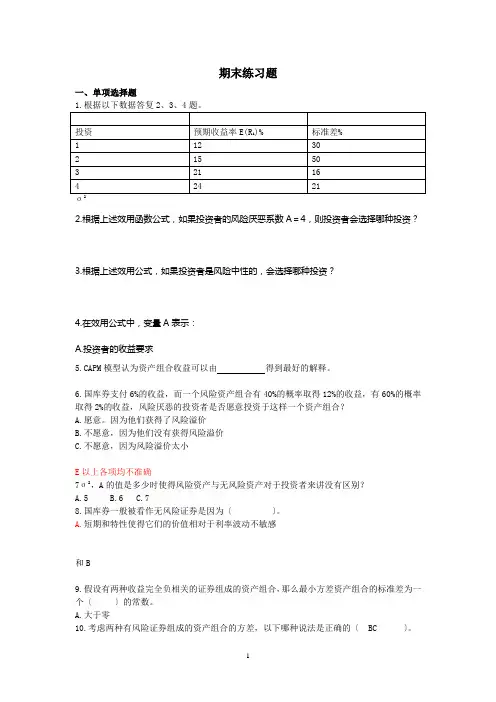
期末练习题一、单项选择题1.根据以下数据答复2、3、4题。
σ2.根据上述效用函数公式,如果投资者的风险厌恶系数A=4,则投资者会选择哪种投资?3.根据上述效用公式,如果投资者是风险中性的,会选择哪种投资?4.在效用公式中,变量A表示:A.投资者的收益要求5.CAPM模型认为资产组合收益可以由得到最好的解释。
6.国库券支付6%的收益,而一个风险资产组合有40%的概率取得12%的收益,有60%的概率取得2%的收益,风险厌恶的投资者是否愿意投资于这样一个资产组合?A.愿意。
因为他们获得了风险溢价B.不愿意,因为他们没有获得风险溢价C.不愿意,因为风险溢价太小E以上各项均不准确7σ2,A的值是多少时使得风险资产与无风险资产对于投资者来讲没有区别?A.5B.6C.78.国库券一般被看作无风险证券是因为〔〕。
A.短期和特性使得它们的价值相对于利率波动不敏感和B9.假设有两种收益完全负相关的证券组成的资产组合,那么最小方差资产组合的标准差为一个〔〕的常数。
A.大于零10.考虑两种有风险证券组成的资产组合的方差,以下哪种说法是正确的〔 BC 〕。
A.证券的相关系数越高,资产组合的方差减少的越多C.资产组合方差减小的程度依靠于证券的相关性11.从资本市场线上选择资产组合,以下哪些说法正确〔 BCE 〕。
A.风险厌恶度低的投资者将比一般风险厌恶投资者较多投资于无风险资产,较少投资于风险资产的最优组合B. 风险厌恶度高的投资者将比一般风险厌恶投资者较多投资于无风险资产,较少投资于风险资产的最优组合12.根据CAPM模型,贝塔值为1.0,的资产组合的预期收益率为〔 D 〕。
M和r f之间 B。
无风险利率 C. r M-r fM13.债券的到期收益率是:BA.当债券以折价方式出售时,低于息票率;当以溢价方式出售时,高于息票率14.一债券有提前赎回条款是:DA.很有吸引力的,因为可以立即得到本金加上溢价,从而获得高收益B.当利率较高时倾向于执行赎回条款,因为可以节省更多的利息支出C.相对于不可赎回的类似债券而言,通常有一个更高的收益率15.下面哪一种情况是以折价方式卖出债券?CA.债券息票率大于当期收益率,也大于债券的到期收益率B.债券息票率等于当期收益率,也等于债券的到期收益率C.债券息票率小于当期收益率,也小于债券的到期收益率D.债券息票率小于当期收益率,但大于债券的到期收益率16.考虑一个5年期债券,息票率为10%,但现在的收益率为8%,如果利率保持不变,一年以后这种债券的价格会:B17.以下哪一条对投资者而言,可转换债券不是有利的:A18.六个月期国库券即期利率为4%,一年期国库券即期利率为5%,则六个月后隐含的六个月远期利率为:DA.3.0%B.4.5%C.5.5%D.6.0%19.把以下两类债券按久期长短排序。
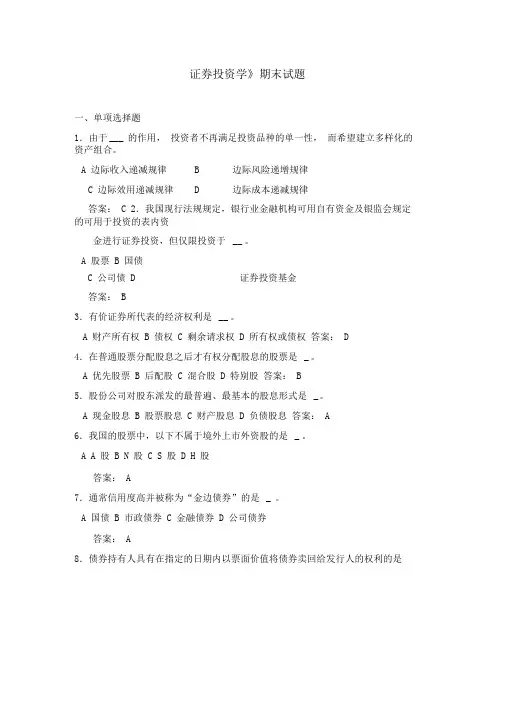
证券投资学》期末试题一、单项选择题1.由于___ 的作用,投资者不再满足投资品种的单一性,而希望建立多样化的资产组合。
A 边际收入递减规律B 边际风险递增规律C 边际效用递减规律D 边际成本递减规律答案: C 2.我国现行法规规定,银行业金融机构可用自有资金及银监会规定的可用于投资的表内资金进行证券投资,但仅限投资于__ 。
A 股票B 国债C 公司债D 证券投资基金答案: B3.有价证券所代表的经济权利是__ 。
A 财产所有权B 债权C 剩余请求权D 所有权或债权答案: D4.在普通股票分配股息之后才有权分配股息的股票是_ 。
A 优先股票B 后配股C 混合股D 特别股答案: B5.股份公司对股东派发的最普遍、最基本的股息形式是_ 。
A 现金股息B 股票股息C 财产股息D 负债股息答案: A6.我国的股票中,以下不属于境外上市外资股的是_ 。
A A 股B N 股C S 股D H 股答案: A7.通常信用度高并被称为“金边债券”的是_ 。
A 国债B 市政债券C 金融债券D 公司债券答案: A8.债券持有人具有在指定的日期内以票面价值将债券卖回给发行人的权利的是C 附有可转换条款的债券答案: B 9.证券投资基金由 ___ 托管,由 ___ 管理和操作。
A 托管人 管理人B 托管人 托管人C 管理人 托管人D 管理人 管理人答案: A10.投资者作为公司的股东,有权对公司的重大投资决策发表意见,进行表决的是答案: A 11.以下不属于封闭型投资基金特点的是 _ 。
A 有明确的存续期限B 规模固定C 交易价格不受市场供求的影响D 在证券交易所交易 答案: C12.主要投资目标在于追求最高资本增值的基金是 _ 。
A 成长型基金B 股票型基金C 平衡型基金D 收入型基金 答案: A13.接受客户委托,在交易所中代理客户买卖证券并收取一定佣金的经纪商是 。
A 场内经纪商B 佣金经纪商C 专业经纪商D 做市商 答案: B14.专门为证券发行与证券交易办理登记、 存管、 过户和资金结算交收业务的中介机构是备A 信用评级机构B 证券登记结算公司C 证券信息公司D 按揭证券公司 答案: B15.以下关于证券发行市场的表述正确的是 _A 有固定场所B 有统一时间C 证券发行价格与证券票面价格较为接近D 证券发行价格与证券票面价格差异很大答案: C16.在股票发行制度中,奉行公开管理原则的制度是 。
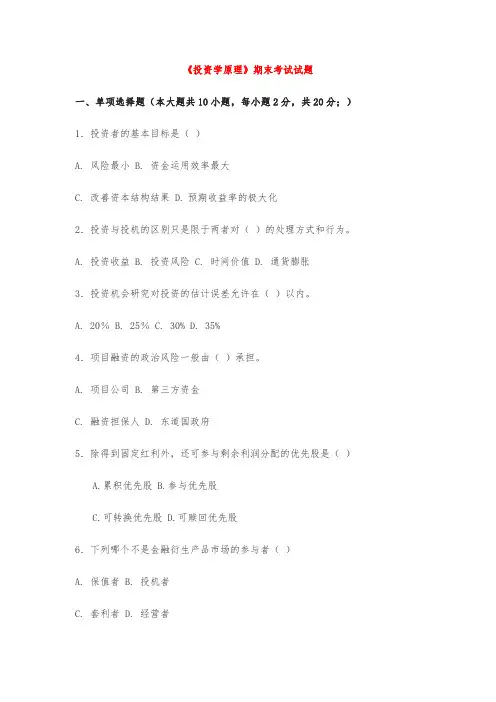
《投资学原理》期末考试试题一、单项选择题(本大题共10小题,每小题2分,共20分;)1.投资者的基本目标是()A.风险最小B.资金运用效率最大C.改善资本结构结果D.预期收益率的极大化2.投资与投机的区别只是限于两者对()的处理方式和行为。
A.投资收益B.投资风险C.时间价值D.通货膨胀3.投资机会研究对投资的估计误差允许在()以内。
A.20%B.25%C.30%D.35%4.项目融资的政治风险一般由()承担。
A.项目公司B.第三方资金C.融资担保人D.东道国政府5.除得到固定红利外,还可参与剩余利润分配的优先股是()A.累积优先股B.参与优先股C.可转换优先股D.可赎回优先股6.下列哪个不是金融衍生产品市场的参与者()A.保值者B.投机者C.套利者D.经营者7.我国的上证指数采用()方法编制。
A.算术平均B.指数平均C.修正平均D.加权平均8.基金反映的是投资者与基金管理者之间的()关系。
A.所有权B.信托契约C.债权债务D.风险管理9.金融期货合约都是()A.标准化B.关联交易C.保证交易D.非标准化10.金融期货的交易必须在()进行。
A.交易所外B.交易所内C.经纪人之间D.交易中介之间二、简答题(每小题10分,共30分)1.货币时间价值有何作用?2.债券的价格法则是什么?3.封闭型基金的优缺点是什么?三、计算题(每小题10分,共20分)1.某企业开发一种产品,固定成本为10万元,产品的单位变动成本为30元,单价为50元。
(1)当产量达到多少时,企业才能保本?(2)由于市场竞争激烈,产品必须降价销售,价格降为40元,此时保本点的产量为多少?2.方案甲投资为20000元,预期寿命5年,在5年内每年可得净收益6687.62元,该方案的投资回收期是多少?假定贴现率为12%,计算项目净现值。
(5年12%的现值系数为3.605)(3)该方案内部收益率是多少?(5年18%的现值系数为3.127,5年20%的现值系数为2.991)四、论述题(每小题15分,共30分)1、试述加快我国证券投资基金发展的对策。
TUTORIAL – SESSION 01CHAPTER 011.Discuss the agency problem.2.Discuss the similarities and differences between real and financial assets.3.Discuss the following ongoing trends as they relate to the field of investments:globalization, financial engineering, securitization, and computer networks.CHAPTER 02Use the following to answer questions 1 to 3:Consider the following three stocks:1. The price-weighted index constructed with the three stocks isA) 30B) 40C) 50D) 60E) 70Answer: B Difficulty: EasyRationale: ($40 + $70 + $10)/3 = $40.2. The value-weighted index constructed with the three stocks using a divisor of 100 isA) 1.2B) 1200C) 490D) 4900E) 49Answer: C Difficulty: ModerateRationale: The sum of the value of the three stocks divided by 100 is 490: [($40 x 200) + ($70 x 500) + ($10 x 600)] /100 = 4903. Assume at these prices the value-weighted index constructed with the three stocks is490. What would the index be if stock B is split 2 for 1 and stock C 4 for 1?A) 265B) 430C) 355D) 490E) 1000Answer: D Difficulty: ModerateRationale: Value-weighted indexes are not affected by stock splits.4. An investor purchases one municipal and one corporate bond that pay rates of returnof 8% and 10%, respectively. If the investor is in the 20% marginal tax bracket, his or her after tax rates of return on the municipal and corporate bonds would be ________ and ______, respectively.A) 8% and 10%B) 8% and 8%C) 6.4% and 8%D) 6.4% and 10%E) 10% and 10%Answer: B Difficulty: ModerateRationale: rc = 0.10(1 - 0.20) = 0.08, or 8%; rm = 0.08(1 - 0) = 8%.5. A 5.5% 20-year municipal bond is currently priced to yield 7.2%. For a taxpayer inthe 33% marginal tax bracket, this bond would offer an equivalent taxable yield of:A) 8.20%.B) 10.75%.C) 11.40%.D) 4.82%.E) none of the above.Answer: B Difficulty: ModerateRationale: 0.072 = rm (1-t); 0.072 = rm / (0.67); rm = 0.1075 = 10.75%6. In order for you to be indifferent between the after tax returns on a corporate bondpaying 8.5% and a tax-exempt municipal bond paying 6.12%, what would your tax bracket need to be?A) 33%B) 72%C) 15%D) 28%E) Cannot tell from the information given.0612 = .085(1-t); (1-t) = 0.72; t = .287. Suppose an investor is considering a corporate bond with a 7.17% before-tax yield anda municipal bond with a 5.93% before-tax yield. At what marginal tax rate would theinvestor be indifferent between investing in the corporate and investing in the muni?A) 15.4%B) 23.7%C) 39.5%D) 17.3%E) 12.4%tm = 1 - (5.93%/7.17%) = 17.29%Use the following to answer questions 8 to 9:8. Based on the information given, for a price-weighted index of the three stockscalculate:A) the rate of return for the first period (t=0 to t=1).B) the value of the divisor in the second period (t=2). Assume that Stock A had a 2-1split during this period.C) the rate of return for the second period (t=1 to t=2).A. The price-weighted index at time 0 is (70 + 85 + 105)/3 = 86.67. The price-weighted indexat time 1 is (72 + 81 + 98)/3 = 83.67. The return on the index is 83.67/86.67 - 1 = -3.46%.B. The divisor must change to reflect the stock split. Because nothing else fundamentallychanged, the value of the index should remain 83.67. So the new divisor is (36 +81 + 98)/83.67 = 2.57. The index value is (36 + 81 + 98)/2.57 = 83.67.C. The rate of return for the second period is 83.67/83.67 - 1 = 0.00%9. Based on the information given for the three stocks, calculate the first-period rates ofreturn (from t=0 to t=1) onA) a market-value-weighted index.B) an equally-weighted index.C) a geometric index.A. The total market value at time 0 is $70 * 200 + $85 * 500 + $105 * 300 = $88,000. Thetotal market value at time 1 is $72 * 200 + $81 * 500 + $98 * 300 = $84,300. Thereturn is $84,300/$88,000 - 1 = -4.20%.B. The return on Stock A for the first period is $72/$70 - 1 = 2.86%. The return on Stock Bfor the first period is $81/$85 - 1 = -4.71%. The return on Stock C for the firstperiod is $98/$105 - 1 = -6.67%. The return on an equally weighted index of thethree stocks is (2.86% - 4.71% - 6.67%)/3 = -2.84%C. The geometric average return is [(1+.0286)(1-.0471)(1-.0667)](1/3)-1 =[(1.0286)(0.9529)(0.9333)]0.3333 -1 = -2.92%10.Discuss the advantages and disadvantages of common stock ownership, relative toother investment alternatives.CHAPTER 031. Assume you purchased 200 shares of XYZ common stock on margin at $70 per sharefrom your broker. If the initial margin is 55%, how much did you borrow from the broker?A) $6,000B) $4,000C) $7,700D) $7,000E) $6,300Answer: E Difficulty: ModerateRationale: 200 shares * $70/share * (1-0.55) = $14,000 * (0.45) = $6,300.2. You sold short 200 shares of common stock at $60 per share. The initial margin is60%. Your initial investment wasA) $4,800.B) $12,000.C) $5,600.D) $7,200.E) none of the above.Answer: D Difficulty: ModerateRationale: 200 shares * $60/share * 0.60 = $12,000 * 0.60 = $7,2003. You purchased 100 shares of ABC common stock on margin at $70 per share.Assume the initial margin is 50% and the maintenance margin is 30%. Below what stock price level would you get a margin call? Assume the stock pays no dividend;ignore interest on margin.A) $21B) $50C) $49D) $80E) none of the aboveAnswer: B Difficulty: DifficultRationale: 100 shares * $70 * .5 = $7,000 * 0.5 = $3,500 (loan amount); 0.30 = (100P - $3,500)/100P; 30P = 100P - $3,500; -70P = -$3,500; P = $50.4. You purchased 100 shares of common stock on margin at $45 per share. Assume theinitial margin is 50% and the stock pays no dividend. What would the maintenance margin be if a margin call is made at a stock price of $30? Ignore interest on margin.A) 0.33B) 0.55C) 0.43D) 0.23E) 0.25Answer: E Difficulty: DifficultRationale: 100 shares * $45/share * 0.5 = $4,500 * 0.5 = $2,250 (loan amount); X = [100($30) - $2,250]/100($30); X = 0.25.5. You purchased 300 shares of common stock on margin for $60 per share. The initialmargin is 60% and the stock pays no dividend. What would your rate of return be if you sell the stock at $45 per share? Ignore interest on margin.A) 25%B) -33%C) 44%D) -42%E) –54%Answer: D Difficulty: DifficultRationale: 300($60)(0.60) = $10,800 investment; 300($60) = $18,000 *(0.40) = $7,200 loan;Proceeds after selling stock and repaying loan: $13,500 - $7,200 = $6,300; Return= ($6,300 - $10,800)/$10,800 = - 41.67%.6. Assume you sell short 100 shares of common stock at $45 per share, with initialmargin at 50%. What would be your rate of return if you repurchase the stock at$40/share? The stock paid no dividends during the period, and you did not remove any money from the account before making the offsetting transaction.A) 20%B) 25%C) 22%D) 77%E) none of the aboveAnswer: C Difficulty: ModerateRationale: Profit on stock = ($45 - $40) * 100 = $500, $500/$2,250 (initial investment) =22.22%7. You want to purchase XYZ stock at $60 from your broker using as little of your ownmoney as possible. If initial margin is 50% and you have $3000 to invest, how many shares can you buy?A) 100 sharesB) 200 sharesC) 50 sharesD) 500 sharesE) 25 sharesAnswer: A Difficulty: ModerateRationale: .5 = [(Q * $60)-$3,000] / (Q * $60); $30Q = $60Q-$3,000; $30Q = $3,000; Q=100.8. You buy 300 shares of Qualitycorp for $30 per share and deposit initial margin of50%. The next day Qualitycorp's price drops to $25 per share. What is your actual margin?A) 50%B) 40%C) 33%D) 60%E) 25%Answer: B Difficulty: ModerateRationale: AM = [300 ($25) - .5 (300) ($30) ] / [300 ($25)] = .409. You sold short 100 shares of common stock at $45 per share. The initial margin is50%. Your initial investment wasA) $4,800.B) $12,000.C) $2,250.D) $7,200.E) none of the above.Answer: C Difficulty: ModerateRationale: 100 shares * $45/share * 0.50 = $4,500 * 0.50 = $2,25010. List three factors that are listing requirements for the New York Stock Exchange.Why does the exchange have such requirements?CHAPTER 041. Multiple Mutual Funds had year-end assets of $457,000,000 and liabilities of$17,000,000. There were 24,300,000 shares in the fund at year-end. What wasMultiple Mutual's Net Asset Value?A) $18.11B) $18.81C) $69.96D) $7.00E) $181.07Answer: A Difficulty: ModerateRationale: (457,000,000 - 17,000,000) / 24,300,000 = $18.112. Diversified Portfolios had year-end assets of $279,000,000 and liabilities of$43,000,000. If Diversified's NAV was $42.13, how many shares must have beenheld in the fund?A) 43,000,000B) 6,488,372C) 5,601,709D) 1,182,203E) None of the above.Answer: C Difficulty: ModerateRationale: ($279,000,000 - 43,000,000) / $42.13 = 5,601,708.996.3. Pinnacle Fund had year-end assets of $825,000,000 and liabilities of $25,000,000. IfPinnacle's NAV was $32.18, how many shares must have been held in the fund?A) 21,619,346,92B) 22,930,546.28C) 24,860,161.59D) 25,693,645.25E) None of the above.Answer: C Difficulty: ModerateRationale: ($825,000,000 - 25,000,000) / $32.18 = 24,860,161.59.4. The Profitability Fund had NAV per share of $17.50 on January 1, 2005. OnDecember 31 of the same year the fund's NAV was $19.47. Income distributions were $0.75 and the fund had capital gain distributions of $1.00. Without considering taxes and transactions costs, what rate of return did an investor receive on the Profitabilityfund last year?A) 11.26%B) 15.54%C) 16.97%D) 21.26%E) 9.83%Answer: D Difficulty: ModerateRationale: R = ($19.47 - 17.50 + .75 + 1.00) / $17.50 = 21.26%5. Patty O'Furniture purchased 100 shares of Green Isle mutual fund at a net asset valueof $42 per share. During the year Patty received dividend income distributions of$2.00 per share and capital gains distributions of $4.30 per share. At the end of theyear the shares had a net asset value of $40 per share. What was Patty's rate of return on this investment?A) 5.43%B) 10.24%C) 7.19%D) 12.44%E) 9.18%〔40-42+2+4.3〕/42=10.24%6. A mutual fund had year-end assets of $560,000,000 and liabilities of $26,000,000.There were 23,850,000 shares in the fund at year end. What was the mutual fund'sNet Asset Value?A) $22.87B) $22.39C) $22.24D) $17.61E) $19.25Answer: B Difficulty: ModerateRationale: (560,000,000 - 26,000,000) / 23,850,000 = $22.3897. A mutual fund had year-end assets of $465,000,000 and liabilities of $37,000,000. Ifthe fund NAV was $56.12, how many shares must have been held in the fund?A) 4,300,000B) 6,488,372C) 8,601,709D) 7,626,515E) None of the above.Answer: D Difficulty: ModerateRationale: ($465,000,000 37,000,000) / $56.12 = 7,626,5158. A mutual fund had NAV per share of $26.25 on January 1, 2005. On December 31 ofthe same year the fund's rate of return for the year was 16.4%. Income distributionswere $1.27 and the fund had capital gain distributions of $1.85. Without considering taxes and transactions costs, what ending NAV would you calculate?A) $27.44B) $33.88C) $24.69D) $42.03E) $16.62Answer: A Difficulty: ModerateRationale: .164 = (P - $26.25 + 1.27 + 1.85) / $26.25; P = $27.4359. A mutual funds had average daily assets of $2.0 billion on 2005. The fund sold $500million worth of stock and purchased $600 million worth of stock during the year.The funds turnover ratio is ___.A) 27.5%B) 12%C) 15%D) 25%E) 20%Answer: D Difficulty: ModerateRationale: 500,000,000 / 2,000,000,000 = 25%10. You purchased shares of a mutual fund at a price of $20 per share at the beginning ofthe year and paid a front-end load of 5.75%. If the securities in which the findinvested increased in value by 11% during the year, and the funds expense ratio was1.25%, your return if you sold the fund at the end of the year would be ____________.A) 4.33B) 3.44C) 2.45D) 6.87E) None of the above[20*(1-5.75%)*(1+11%-1.25%)-20]/20=0.034311. List and describe the more important types of mutual funds according to theirinvestment policy and use.CHAPTER 051. Over the past year you earned a nominal rate of interest of 10 percent on your money.The inflation rate was 5 percent over the same period. The exact actual growth rate of your purchasing power wasA) 15.5%.B) 10.0%.C) 5.0%.D) 4.8%.E) 15.0%Answer: D Difficulty: ModerateRationale: r = (1+R) / (1+I) - 1; 1.10% / 1.5% - 1 = 4.8%.2. You purchased a share of stock for $20. One year later you received $1 as dividendand sold the share for $29. What was your holding period return?A) 45%B) 50%C) 5%D) 40%E) none of the aboveAnswer: B Difficulty: ModerateRationale: ($1 + $29 - $20)/$20 = 0.5000, or 50%.Use the following to answer questions 3-5:You have been given this probability distribution for the holding period return for KMP stock:3. What is the expected holding period return for KMP stock?A) 10.40%B) 9.32%C) 11.63%D) 11.54%E) 10.88%Answer: A Difficulty: ModerateRationale: HPR = .30 (18%) + .50 (12%) + .20 (-5%) = 10.4%4. What is the expected standard deviation for KMP stock?A) 6.91%B) 8.13%C) 7.79%D) 7.25%E) 8.85%Answer: B Difficulty: DifficultRationale: s = [.30 (18 - 10.4)2 + .50 (12 - 10.4)2 + .20 (-5 - 10.4)2]1/2 = 8.13%5. What is the expected variance for KMP stock?A) 66.04%B) 69.96%C) 77.04%D) 63.72%E) 78.45%A Difficulty: DifficultRationale: s = [.30 (18 - 10.4)2 + .50 (12 - 10.4)2 + .20 (5 - 10.4)2] = 66.04%6. You purchase a share of Boeing stock for $90. One year later, after receiving adividend of $3, you sell the stock for $92. What was your holding period return?A) 4.44%B) 2.22%C) 3.33%D) 5.56%E) none of the aboveAnswer: D Difficulty: ModerateRationale: HPR = (92 - 90 + 3) / 90 = 5.56%7. An investor purchased a bond 45 days ago for $985. He received $15 in interest andsold the bond for $980. What is the holding period return on his investment?A) 1.52%B) 0.50%C) 1.02%D) 0.01%E) None of the aboveAnswer: C Difficulty: EasyRationale: HPR = ($15+980-985)/$985 = .010152284 = approximately 1.02%.8. Over the past year you earned a nominal rate of interest of 8 percent on your money.The inflation rate was 3.5 percent over the same period. The exact actual growth rate of your purchasing power wasA) 15.55%.B) 4.35%.C) 5.02%.D) 4.81%.E) 15.04%Answer: B Difficulty: ModerateRationale: r = (1+R) / (1+I) - 1 ; 1.08 / 1.035 - 1 = 4.35%.9. Over the past year you earned a nominal rate of interest of 14 percent on your money.The inflation rate was 2 percent over the same period. The exact actual growth rate of your purchasing power wasA) 11.76%.B) 16.00%.C) 15.02%.D) 14.32%.E) none of the above.10. An investment provides a 2% return semi-annually, its effective annual rate isA) 2%.B) 4%.C) 4.02%D) 4.04%E) none of the above(1.02)2 -1 = 4.04%11. Discuss the relationships between interest rates (both real and nominal), expected inflationrates, and tax rates on investment returns.12. Discuss why common stocks must earn a risk premium.CHAPTER 071. Market risk is also referred to asA) systematic risk, diversifiable risk.B) systematic risk, nondiversifiable risk.C) unique risk, nondiversifiable risk.D) unique risk, diversifiable risk.E) none of the above.Answer: B Difficulty: EasyRationale: Market, systematic, and nondiversifiable risk are synonyms referring to the risk that cannot be eliminated from the portfolio. Diversifiable, unique, nonsystematic,and firm-specific risks are synonyms referring to the risk that can be eliminatedfrom the portfolio by diversification.2. The variance of a portfolio of risky securitiesA) is a weighted sum of the securities' variances.B) is the sum of the securities' variances.C) is the weighted sum of the securities' variances and covariances.D) is the sum of the securities' covariances.E) none of the above.Answer: C Difficulty: ModerateRationale: The variance of a portfolio of risky securities is a weighted sum taking into accou nt both the variance of the individual securities and the covariances between securities.3. Other things equal, diversification is most effective whenA) securities' returns are uncorrelated.B) securities' returns are positively correlated.C) securities' returns are high.D) securities' returns are negatively correlated.E) B and C.Answer: D Difficulty: ModerateRationale: Negative correlation among securities results in the greatest reduction of portfolio risk, which is the goal of diversification.4. The Capital Allocation Line provided by a risk-free security and N risky securities isA) the line that connects the risk-free rate and the global minimum-variance portfolioof the risky securities.B) the line that connects the risk-free rate and the portfolio of the risky securities thathas the highest expected return on the efficient frontier.C) the line tangent to the efficient frontier of risky securities drawn from the risk-freerate.D) the horizontal line drawn from the risk-free rate.E) none of the above.Answer: C Difficulty: ModerateRationale: The Capital Allocation Line represents the most efficient combinations of the risk-free asset and risky securities. Only C meets that definition.5. Which of the following statements is (are) true regarding the variance of a portfolio oftwo risky securities?A) The higher the coefficient of correlation between securities, the greater thereduction in the portfolio variance.B) There is a linear relationship between the securities' coefficient of correlation andthe portfolio variance.C) The degree to which the portfolio variance is reduced depends on the degree ofcorrelation between securities.D) A and B.E) A and C.Answer: C Difficulty: ModerateRationale: The lower the correlation between the returns of the securities, the more portfolio r isk is reduced.Use the following to answer questions 6-11:Consider the following probability distribution for stocks A and B:6. The expected rates of return of stocks A and B are _____ and _____ , respectively.A) 13.2%; 9%B) 14%; 10%C) 13.2%; 7.7%D) 7.7%; 13.2%E) none of the aboveAnswer: C Difficulty: EasyRationale: E(RA) = 0.1(10%) + 0.2(13%) + 0.2(12%) + 0.3(14%) + 0.2(15%) = 13.2%;E(RB) = 0.1(8%) + 0.2(7%) + 0.2(6%) + 0.3(9%) + 0.2(8%) = 7.7%.7. The standard deviations of stocks A and B are _____ and _____, respectively.A) 1.5%; 1.9%B) 2.5%; 1.1%C) 3.2%; 2.0%D) 1.5%; 1.1%E) none of the aboveAnswer: D Difficulty: ModerateRationale: sA = [0.1(10% - 13.2%)2 + 0.2(13% - 13.2%)2 + 0.2(12% - 13.2%)2 +0.3(14% - 13.2%)2 + 0.2(15% - 13.2%)2]1/2 = 1.5%; sB = [0.1(8% - 7.7%)2 + 0.2(7% -7.7%)2 + 0.2(6% - 7.7%)2 + 0.3(9% - 7.7%)2 + 0.2(8% - 7.7%)2]1/2 = 1.1%.8. The coefficient of correlation between A and B isA) 0.47.B) 0.60.C) 0.58D) 1.20.E) none of the above.Answer: A Difficulty: DifficultRationale: covA,B = 0.1(10% - 13.2%)(8% - 7.7%) + 0.2(13% - 13.2%)(7% - 7.7%) +0.2(12% - 13.2%)(6% - 7.7%) + 0.3(14% - 13.2%)(9% - 7.7%) + 0.2(15% - 13.2%)(8% -7.7%) = 0.76; rA,B = 0.76/[(1.1)(1.5)] = 0.47.9. If you invest 40% of your money in A and 60% in B, what would be your portfolio'sexpected rate of return and standard deviation?A) 9.9%; 3%B) 9.9%; 1.1%C) 11%; 1.1%D) 11%; 3%E) none of the aboveAnswer: B Difficulty: DifficultRationale: E(RP) = 0.4(13.2%) + 0.6(7.7%) = 9.9%; sP = [(0.4)2(1.5)2 + (0.6)2(1.1)2 +2(0.4)(0.6)(1.5)(1.1)(0.46)]1/2 = 1.1%.10. Let G be the global minimum variance portfolio. The weights of A and B in G are__________ and __________, respectively.A) 0.40; 0.60B) 0.66; 0.34C) 0.34; 0.66D) 0.76; 0.24E) 0.24; 0.76Answer: E Difficulty: DifficultRationale: wA = [(1.1)2 - (1.5)(1.1)(0.46)]/[(1.5)2 + (1.1)2 - (2)(1.5)(1.1)(0.46) = 0.23; wB = 1-0.23 = 0.77.Note that the above solution assumes the solutions obtained in question 13 and 14.11. The expected rate of return and standard deviation of the global minimum varianceportfolio, G, are __________ and __________, respectively.A) 10.07%; 1.05%B) 9.04%; 2.03%C) 10.07%; 3.01%D) 9.04%; 1.05%E) none of the aboveAnswer: D Difficulty: ModerateRationale: E(RG) = 0.23(13.2%) + 0.77(7.7%) = 8.97% . 9%; sG = [(0.23)2(1.5)2 + (0.77)2(1.1)2 + (2)(0.23)(0.77)(1.5)(1.1)(0.46)]1/2 = 1.05%.。
可编辑修改精选全文完整版《证券投资学》期末考试卷及答案5一、单选题(每题1分,共20分)1.发行人在外国证券市场发行的,以市场所在国货币为面值的债券称为______。
A. 扬基债券B. 武士债券C. 外国债券D. 欧洲债券2.我国的股票发行实行______。
A.核准制 B. 注册制 C. 审批制 D. 登记制3.债券投资中,通常投资者在投资前就可确定的是_____。
A. 债券利息B. 资本利得C. 债券收益率D. 债券风险4.下列股票投资者中,旨在长期参股并可能谋求进入公司决策管理层的投资者被称为______。
A 投机者B 机构投资者C QFIID 战略投资者5.股份有限公司在破产清算时,下列有关清偿顺序的表述正确的是______。
A. 支付清算费用-支付工资、劳保费用-支付股息-缴纳所欠税款B. 支付清算费用-支付工资、劳保费用-缴纳所欠税款-支付股息C. 缴纳所欠税款-支付清算费用-支付工资、劳保费用-支付股息D. 支付工资、劳保费用-支付清算费用-缴纳所欠税款-支付股息6.以下关于系统风险的说法中不正确的是_____。
A. 系统风险是那些由于某种全局性的因素引起的投资收益的可能变动B. 系统风险是公司无法控制和回避的C. 系统风险是不能通过多样化投资进行分散的D. 系统风险对于不同证券收益的影响程度是相同的7.以下关于市场风险说法中,表述正确是的_____。
A. 市场风险是指由于证券市场长期趋势变动而引起的风险B. 市场风险是指市场利率的变动引起证券投资收益的不确定性C. 市场风险对于投资者来说是无论如何都无法减轻的D. 市场风险属于非系统风险8.某一个投资组合由两只股票组成,则以下关于该组合风险说法中正确的是_____。
A. 该投资组合的收益率一定高于组合中任何单独股票的收益率B. 该投资组合的风险一定低于组合中任何单独股票的风险C. 投资组合的风险就是这两只股票各自风险的总和D. 如果这两只股票分别属于两个互相替代的行业,那么组合的风险要小于单只股票的风险9.股市是国民经济晴雨表,能够反映股票市场整体价格水平的指标是_____。
《投资学》复习题一、单项选择题1、如果你相信市场是()有效市场的形式,你会觉得股价反映了所有相关信息,包括那些只提供给内幕人士的信息。
a. 半强式b. 强式c. 弱式d. a、b和c2.很多情况下人们往往把能够带来报酬的支出行为称为______。
A 支出B 储蓄C 投资D 消费3、当其他条件相同,分散化投资在那种情况下最有效?( )a. 组成证券的收益不相关b. 组成证券的收益正相关c. 组成证券的收益很高d. 组成证券的收益负相关4.如果强式有效市场假定成立,下列哪一种说法是正确的?()A、未来事件能够被准确地预测。
B、价格能够反映所有可得到的信息。
C、证券价格由于不可辨别的原因而变化。
D、价格不起伏。
5. 市场风险也可解释为()。
a. 系统风险,可分散化的风险b. 系统风险,不可分散化的风险c. 个别风险,不可分散化的风险d. 个别风险,可分散化的风险6.半强式有效市场假定认为股票价格()A、反映了已往的全部价格信息。
B、反映了全部的公开可得信息。
C、反映了包括内幕信息在内的全部相关信息。
D、是可以预测的。
7.对已经进行贴现,尚未到期的票据转做一次贴现的行为称为( )A.再贴现 B.承兑 C.转贴现 D.多次贴现8、其他条件不变,债券的价格与收益率()。
a. 正相关b. 反相关c. 有时正相关,有时反相关d. 无关9.在红利贴现模型中,不影响贴现率k的因素是()。
A、真实无风险回报率B、股票风险溢价C、资产回报率D、预期通胀率。
10.我国现行的证券交易制度规定,在一个交易日内,除首日上市证券外,每只股票或基金的交易价格相对上一个交易日收市价的涨跌幅度不得超过______。
A 5%B 10%C 15%D 20%11、在合约到期前,交易者除了进行实物交割,还可以通过______来结束交易。
A 投机B 对冲C 交收D 主动放弃12、以包销或代销方式帮助发行人发行证券的商号或机构叫做( )A.证券承销人 B.证券交易经纪人 C.证券交易所 D.证券结算公司13、期权交易是对______的买卖。
投资学考试试题及答案投资学考试试题及答案投资学是金融学中的一个重要分支,研究的是投资决策和资本配置的理论和方法。
在金融行业中,投资学的知识是非常重要的,因为它涉及到投资者如何进行投资决策,如何评估投资项目的风险和回报,以及如何优化资本配置等问题。
在投资学的学习过程中,考试是一种常见的评估方式,下面我们将介绍一些投资学考试的试题及答案。
第一部分:选择题1. 以下哪个是投资学的核心概念?a) 股票b) 风险c) 利率d) 债券答案:b) 风险2. 投资组合是指投资者持有的一组投资资产,以下哪个是投资组合的主要目标?a) 最大化回报b) 最小化风险c) 最大化流动性d) 最小化成本答案:b) 最小化风险3. 市场有效假设是投资学的重要理论之一,以下哪个描述最符合市场有效假设?a) 市场上的价格是随机波动的,无法预测b) 市场上的价格是由供求关系决定的c) 市场上的价格是由投资者的心理预期决定的d) 市场上的价格是由政府的干预决定的答案:a) 市场上的价格是随机波动的,无法预测第二部分:简答题1. 请简要介绍一下投资组合理论。
答案:投资组合理论是投资学的核心理论之一,它研究的是如何选择和构建一个投资组合,以实现最佳的风险回报平衡。
投资组合理论的基本原理是通过将不同的资产进行组合,可以降低整体投资组合的风险,同时提高回报。
投资组合理论的关键是通过投资资产之间的相关性来实现风险的分散,即通过将不同类型的资产组合在一起,可以降低整体投资组合的波动性。
2. 什么是资本资产定价模型(CAPM)?答案:资本资产定价模型(CAPM)是投资学中的一种重要模型,用于估计资产的预期回报率。
CAPM模型的基本原理是资产的预期回报率应该与其风险相关,即高风险资产应该有高回报率,低风险资产应该有低回报率。
CAPM模型的关键是通过计算资产的贝塔系数来衡量其风险,贝塔系数越高,代表资产的风险越大,预期回报率也应该越高。
第三部分:计算题1. 假设有两个投资项目A和B,其预期回报率和风险如下表所示:项目预期回报率风险(标准差)A 10% 15%B 8% 10%请计算项目A和B的夏普比率,并分析哪个项目更具吸引力。
《投资学概论》期末考试复习练习题及参考答案一、名词解释1、投资主体答案:投资主体是指从事投资活动、具有资金来源和投资决策能力、享有投资收益、承担投资责任和风险的法人或自然人。
2、投资环境答案:投资环境是指围绕着投资主体存在和变化发展的,足以影响或制约投资活动及其结果的各种自然、技术、经济和社会条件的总称。
它包括与一定投资项目相关的政治、经济、自然、社会等方面的因素,并有这些因素相互交织、相互作用、相互制约而成有机整体。
3、投资筹集答案:投资筹集就是指把投资资金从形成者和暂时不用者手里收集到投资运用着手中的过程。
人们有时也把投资主体动用自有资金视为投资筹集,这是对投资筹集的广义理解。
4、投资决策答案:投资决策是指从项目投资主体的利益出发,根据客观条件和投资项目的特点,在掌握有关信息的基础上,运用科学的决策手段和方法,按照一定的程序和标准,对投资项目作出选择或决定的过程。
5、国内投资规模答案:国内投资规模是指按国土原则计算的,凡在中国的领土上,不论是中国的政府、企业、个人投资还是合资企业或外商独资企业的投资,都要计算在内。
即按照国土原则计算的这个规模是由对内投资规模和引进外资规模两个部分构成的。
6、产业投资结构答案:产业投资结构是指一定时期的投资在各产业部门之间的分配数量及其比例关系,是指各个产业部门之间的产出构成结构或各个产业部门的生产能力结构,它是投资结构的主体和基础。
狭义的投资结构指的就是投资的产业结构。
7、投资布局答案:投资布局是指投资在一定地域空间的分布;深入地讲,是指投资及其载体投资项目在一定地域空间的分布,连同以此种分布为基础的组合。
它与投资规模、投资结构、投资时序一起构成投资分配中带全局性的宏观经济问题。
8、投资实施答案:投资实施的含义有广义和狭义之分。
广义的投资实施也称为投资使用,是指将投资资金投入使用,使之转变为投资要素并投入建设,最后形成真实资产的过程。
人们有时也从狭义上把投资是是作为项目实施理解,定义为:投资项目立项后进行工程设计、施工建设和竣工验收等项工作。
《证券投资学》期末考试试卷附答案一、单选题(每小题4分,共40分)1.为了满足投资者中途抽回资金、实现变现的需要,( )一般在基金资产中保持一定比例的现金。
A.封闭式基金B.开放式基金C.国债基金D.股票基金2.开放式基金的交易价格取决于( )。
A.基金总资产值B.供求关系C.基金净资产D.基金单位净资产值3.债券和股票的相同点在于( )。
A.具有同样的权利B.收益率一样C.风险一样D.都是筹资手段4.证券是指各类记载并代表( )的法律凳证的统称。
A.一定责任B.一定权利C.一定义务D.一定收益5.境外上市外资股( )。
A.以外币标明面值B.以人民币标明面值,以外币认购C.以外币标明面值,以人民币认购D.以人民币标明面值,以人民币认购6. 有价证券是( )的一种形式。
A.商品证券B.虚拟资本C.权益资本D.债务资本7.外资股是指股份公司向外国和我国香港、澳门、台湾地区发行的股票。
其中属于境内上市外资股的是( )。
A.A股B.B股C.S股D.法人股8.根据《证券投资基金管理暂行办法》的规定,一个基金持有一家上市公司的股票,不得超过该基金净资产的( )。
A.10%B.20%C.30%D.40%9.下列哪个不是普通股股东享有的权利( )。
A.公司重大决策的参与权B.选择管理者B.有优先剩余资产分配权D.优先配股权10.在上海证交所上市的股票中B股是以人民币标明面值的,以( )买卖的。
A.人民币B.美元C.港元D.日元二、名词解释(每小题10分,共20分)1.股票2.股票价格指数三、填空题(本大题共20空,每空2分,共40分)1、证券投资风险有两大类:、。
2、《公司法》中规定,购并指和。
3、我国目前上市公司的重组主要有以下三种方式、、。
4、证券发行审核制度包括两种,即:和5、有价证券可分为、和。
6、投资基金按运作和变现方式分为和。
7、期货商品一般具有、和三大功能。
8、期权一般有两大类:即和。
9、牛市的时候,因为看跌期权被执行的可能性不大,因此买入看涨期权。
TUTORIAL – SESSION 01CHAPTER 011.Discuss the agency problem.2.Discuss the similarities and differences between real and financial assets.3.Discuss the following ongoing trends as they relate to the field of investments:globalization, financial engineering, securitization, and computer networks. CHAPTER 02Use the following to answer questions 1 to 3:Consider the following three stocks:1. The price-weighted index constructed with the three stocks isA) 30B) 40C) 50D) 60E) 70Answer: B Difficulty: EasyRationale: ($40 + $70 + $10)/3 = $40.2. The value-weighted index constructed with the three stocks using a divisorof 100 isA) 1.2B) 1200C) 490D) 4900E) 49Answer: C Difficulty: ModerateRationale: The sum of the value of the three stocks divided by 100 is 490: [($40 x 200) + ($70 x 500) + ($10 x 600)] /100 = 4903. Assume at these prices the value-weighted index constructed with thethree stocks is 490. What would the index be if stock B is split 2 for 1 and stock C 4 for 1?A) 265B) 430C) 355D) 490E) 1000Answer: D Difficulty: ModerateRationale: Value-weighted indexes are not affected by stock splits.4. An investor purchases one municipal and one corporate bond that payrates of return of 8% and 10%, respectively. If the investor is in the 20% marginal tax bracket, his or her after tax rates of return on the municipal and corporate bonds would be ________ and ______, respectively.A) 8% and 10%B) 8% and 8%C) 6.4% and 8%D) 6.4% and 10%E) 10% and 10%Answer: B Difficulty: ModerateRationale: rc = 0.10(1 - 0.20) = 0.08, or 8%; rm = 0.08(1 - 0) = 8%.5. A 5.5% 20-year municipal bond is currently priced to yield 7.2%. For ataxpayer in the 33% marginal tax bracket, this bond would offer an equivalent taxable yield of:A) 8.20%.B) 10.75%.C) 11.40%.D) 4.82%.E) none of the above.Answer: B Difficulty: ModerateRationale: 0.072 = rm (1-t); 0.072 = rm / (0.67); rm = 0.1075 = 10.75%6. In order for you to be indifferent between the after tax returns on acorporate bond paying 8.5% and a tax-exempt municipal bond paying6.12%, what would your tax bracket need to be?A) 33%B) 72%C) 15%D) 28%E) Cannot tell from the information given.0612 = .085(1-t); (1-t) = 0.72; t = .287. Suppose an investor is considering a corporate bond with a 7.17% before-tax yield and a municipal bond with a 5.93% before-tax yield. At what marginal tax rate would the investor be indifferent between investing in the corporate and investing in the muni?A) 15.4%B) 23.7%C) 39.5%D) 17.3%E) 12.4%tm = 1 - (5.93%/7.17%) = 17.29%Use the following to answer questions 8 to 9:8. Based on the information given, for a price-weighted index of the threestocks calculate:A) the rate of return for the first period (t=0 to t=1).B) the value of the divisor in the second period (t=2). Assume that StockA had a 2-1 split during this period.C) the rate of return for the second period (t=1 to t=2).A. The price-weighted index at time 0 is (70 + 85 + 105)/3 = 86.67. The price-weighted index at time 1 is (72 + 81 + 98)/3 = 83.67. The return on theindex is 83.67/86.67 - 1 = -3.46%.B. The divisor must change to reflect the stock split. Because nothing elsefundamentally changed, the value of the index should remain 83.67. Sothe new divisor is (36 + 81 + 98)/83.67 = 2.57. The index value is (36 +81 + 98)/2.57 = 83.67.C. The rate of return for the second period is 83.67/83.67 - 1 = 0.00%9. Based on the information given for the three stocks, calculate the first-period rates of return (from t=0 to t=1) onA) a market-value-weighted index.B) an equally-weighted index.C) a geometric index.A. The total market value at time 0 is $70 * 200 + $85 * 500 + $105 * 300 =$88,000. The total market value at time 1 is $72 * 200 + $81 * 500 +$98 * 300 = $84,300. The return is $84,300/$88,000 - 1 = -4.20%.B. The return on Stock A for the first period is $72/$70 - 1 = 2.86%. The return onStock B for the first period is $81/$85 - 1 = -4.71%. The return on StockC for the first period is $98/$105 - 1 = -6.67%. The return on an equallyweighted index of the three stocks is (2.86% - 4.71% - 6.67%)/3 = -2.84% C. The geometric average return is [(1+.0286)(1-.0471)(1-.0667)](1/3)-1 =[(1.0286)(0.9529)(0.9333)]0.3333 -1 = -2.92%10.Discuss the advantages and disadvantages of common stock ownership,relative to other investment alternatives.CHAPTER 031. Assume you purchased 200 shares of XYZ common stock on margin at $70per share from your broker. If the initial margin is 55%, how much did you borrow from the broker?A) $6,000B) $4,000C) $7,700D) $7,000E) $6,300Answer: E Difficulty: ModerateRationale: 200 shares * $70/share * (1-0.55) = $14,000 * (0.45) = $6,300.2. You sold short 200 shares of common stock at $60 per share. The initialmargin is 60%. Your initial investment wasA) $4,800.B) $12,000.C) $5,600.D) $7,200.E) none of the above.Answer: D Difficulty: ModerateRationale: 200 shares * $60/share * 0.60 = $12,000 * 0.60 = $7,2003. You purchased 100 shares of ABC common stock on margin at $70 pershare. Assume the initial margin is 50% and the maintenance margin is 30%. Below what stock price level would you get a margin call? Assume the stock pays no dividend; ignore interest on margin.A) $21B) $50C) $49D) $80E) none of the aboveAnswer: B Difficulty: DifficultRationale: 100 shares * $70 * .5 = $7,000 * 0.5 = $3,500 (loan amount); 0.30 = (100P - $3,500)/100P; 30P = 100P - $3,500; -70P = -$3,500; P = $50.4. You purchased 100 shares of common stock on margin at $45 per share.Assume the initial margin is 50% and the stock pays no dividend. What would the maintenance margin be if a margin call is made at a stock price of $30? Ignore interest on margin.A) 0.33B) 0.55C) 0.43D) 0.23E) 0.25Answer: E Difficulty: DifficultRationale: 100 shares * $45/share * 0.5 = $4,500 * 0.5 = $2,250 (loan amount); X = [100($30) - $2,250]/100($30); X = 0.25.5. You purchased 300 shares of common stock on margin for $60 per share.The initial margin is 60% and the stock pays no dividend. What would your rate of return be if you sell the stock at $45 per share? Ignore interest on margin.A) 25%B) -33%C) 44%D) -42%E) –54%Answer: D Difficulty: DifficultRationale: 300($60)(0.60) = $10,800 investment; 300($60) = $18,000 *(0.40) = $7,200 loan; Proceeds after selling stock and repaying loan: $13,500 -$7,200 = $6,300; Return = ($6,300 - $10,800)/$10,800 = - 41.67%.6. Assume you sell short 100 shares of common stock at $45 per share, withinitial margin at 50%. What would be your rate of return if you repurchase the stock at $40/share? The stock paid no dividends during the period, and you did not remove any money from the account before making the offsetting transaction.A) 20%B) 25%C) 22%D) 77%E) none of the aboveAnswer: C Difficulty: ModerateRationale: Profit on stock = ($45 - $40) * 100 = $500, $500/$2,250 (initial investment) = 22.22%7. You want to purchase XYZ stock at $60 from your broker using as little ofyour own money as possible. If initial margin is 50% and you have $3000 to invest, how many shares can you buy?A) 100 sharesB) 200 sharesC) 50 sharesD) 500 sharesE) 25 sharesAnswer: A Difficulty: ModerateRationale: .5 = [(Q * $60)-$3,000] / (Q * $60); $30Q = $60Q-$3,000; $30Q = $3,000; Q=100.8. You buy 300 shares of Qualitycorp for $30 per share and deposit initialmargin of 50%. The next day Qualitycorp's price drops to $25 per share.What is your actual margin?A) 50%B) 40%C) 33%D) 60%E) 25%Answer: B Difficulty: ModerateRationale: AM = [300 ($25) - .5 (300) ($30) ] / [300 ($25)] = .409. You sold short 100 shares of common stock at $45 per share. The initialmargin is 50%. Your initial investment wasA) $4,800.B) $12,000.C) $2,250.D) $7,200.E) none of the above.Answer: C Difficulty: ModerateRationale: 100 shares * $45/share * 0.50 = $4,500 * 0.50 = $2,25010. List three factors that are listing requirements for the New York StockExchange. Why does the exchange have such requirements? CHAPTER 041. Multiple Mutual Funds had year-end assets of $457,000,000 and liabilitiesof $17,000,000. There were 24,300,000 shares in the fund at year-end.What was Multiple Mutual's Net Asset Value?A) $18.11B) $18.81C) $69.96D) $7.00E) $181.07Answer: A Difficulty: ModerateRationale: (457,000,000 - 17,000,000) / 24,300,000 = $18.112. Diversified Portfolios had year-end assets of $279,000,000 and liabilities of$43,000,000. If Diversified's NAV was $42.13, how many shares must havebeen held in the fund?A) 43,000,000B) 6,488,372C) 5,601,709D) 1,182,203E) None of the above.Answer: C Difficulty: ModerateRationale: ($279,000,000 - 43,000,000) / $42.13 = 5,601,708.996.3. Pinnacle Fund had year-end assets of $825,000,000 and liabilities of$25,000,000. If Pinnacle's NAV was $32.18, how many shares must havebeen held in the fund?A) 21,619,346,92B) 22,930,546.28C) 24,860,161.59D) 25,693,645.25E) None of the above.Answer: C Difficulty: ModerateRationale: ($825,000,000 - 25,000,000) / $32.18 = 24,860,161.59.4. The Profitability Fund had NAV per share of $17.50 on January 1, 2005. OnDecember 31 of the same year the fund's NAV was $19.47. Incomedistributions were $0.75 and the fund had capital gain distributions of$1.00. Without considering taxes and transactions costs, what rate ofreturn did an investor receive on the Profitability fund last year?A) 11.26%B) 15.54%C) 16.97%D) 21.26%E) 9.83%Answer: D Difficulty: ModerateRationale: R = ($19.47 - 17.50 + .75 + 1.00) / $17.50 = 21.26%5. Patty O'Furniture purchased 100 shares of Green Isle mutual fund at a netasset value of $42 per share. During the year Patty received dividendincome distributions of $2.00 per share and capital gains distributions of$4.30 per share. At the end of the year the shares had a net asset value of $40 per share. What was Patty's rate of return on this investment?A) 5.43%B) 10.24%C) 7.19%D) 12.44%E) 9.18%(40-42+2+4.3)/42=10.24%6. A mutual fund had year-end assets of $560,000,000 and liabilities of$26,000,000. There were 23,850,000 shares in the fund at year end. What was the mutual fund's Net Asset Value?A) $22.87B) $22.39C) $22.24D) $17.61E) $19.25Answer: B Difficulty: ModerateRationale: (560,000,000 - 26,000,000) / 23,850,000 = $22.3897. A mutual fund had year-end assets of $465,000,000 and liabilities of$37,000,000. If the fund NAV was $56.12, how many shares must havebeen held in the fund?A) 4,300,000B) 6,488,372C) 8,601,709D) 7,626,515E) None of the above.Answer: D Difficulty: ModerateRationale: ($465,000,000 37,000,000) / $56.12 = 7,626,5158. A mutual fund had NAV per share of $26.25 on January 1, 2005. OnDecember 31 of the same year the fund's rate of return for the year was16.4%. Income distributions were $1.27 and the fund had capital gaindistributions of $1.85. Without considering taxes and transactions costs,what ending NAV would you calculate?A) $27.44B) $33.88C) $24.69D) $42.03E) $16.62Answer: A Difficulty: ModerateRationale: .164 = (P - $26.25 + 1.27 + 1.85) / $26.25; P = $27.4359. A mutual funds had average daily assets of $2.0 billion on 2005. The fundsold $500 million worth of stock and purchased $600 million worth of stock during the year. The funds turnover ratio is ___.A) 27.5%B) 12%C) 15%D) 25%E) 20%Answer: D Difficulty: ModerateRationale: 500,000,000 / 2,000,000,000 = 25%10. You purchased shares of a mutual fund at a price of $20 per share at thebeginning of the year and paid a front-end load of 5.75%. If the securities in which the find invested increased in value by 11% during the year, andthe funds expense ratio was 1.25%, your return if you sold the fund at the end of the year would be ____________.A) 4.33B) 3.44C) 2.45D) 6.87E) None of the above[20*(1-5.75%)*(1+11%-1.25%)-20]/20=0.034311. List and describe the more important types of mutual funds according totheir investment policy and use.CHAPTER 051. Over the past year you earned a nominal rate of interest of 10 percent onyour money. The inflation rate was 5 percent over the same period. Theexact actual growth rate of your purchasing power wasA) 15.5%.B) 10.0%.C) 5.0%.D) 4.8%.E) 15.0%Answer: D Difficulty: ModerateRationale: r = (1+R) / (1+I) - 1; 1.10% / 1.5% - 1 = 4.8%.2. You purchased a share of stock for $20. One year later you received $1 asdividend and sold the share for $29. What was your holding period return?A) 45%B) 50%C) 5%D) 40%E) none of the aboveAnswer: B Difficulty: ModerateRationale: ($1 + $29 - $20)/$20 = 0.5000, or 50%.Use the following to answer questions 3-5:You have been given this probability distribution for the holding period return for KMP stock:3. What is the expected holding period return for KMP stock?A) 10.40%B) 9.32%C) 11.63%D) 11.54%E) 10.88%Answer: A Difficulty: ModerateRationale: HPR = .30 (18%) + .50 (12%) + .20 (-5%) = 10.4%4. What is the expected standard deviation for KMP stock?A) 6.91%B) 8.13%C) 7.79%D) 7.25%E) 8.85%Answer: B Difficulty: DifficultRationale: s = [.30 (18 - 10.4)2 + .50 (12 - 10.4)2 + .20 (-5 - 10.4)2]1/2 = 8.13%5. What is the expected variance for KMP stock?A) 66.04%B) 69.96%C) 77.04%D) 63.72%E) 78.45%A Difficulty: DifficultRationale: s = [.30 (18 - 10.4)2 + .50 (12 - 10.4)2 + .20 (5 - 10.4)2] = 66.04%6. You purchase a share of Boeing stock for $90. One year later, afterreceiving a dividend of $3, you sell the stock for $92. What was yourholding period return?A) 4.44%B) 2.22%C) 3.33%D) 5.56%E) none of the aboveAnswer: D Difficulty: ModerateRationale: HPR = (92 - 90 + 3) / 90 = 5.56%7. An investor purchased a bond 45 days ago for $985. He received $15 ininterest and sold the bond for $980. What is the holding period return on his investment?A) 1.52%B) 0.50%C) 1.02%D) 0.01%E) None of the aboveAnswer: C Difficulty: EasyRationale: HPR = ($15+980-985)/$985 = .010152284 = approximately 1.02%.8. Over the past year you earned a nominal rate of interest of 8 percent onyour money. The inflation rate was 3.5 percent over the same period. The exact actual growth rate of your purchasing power wasA) 15.55%.B) 4.35%.C) 5.02%.D) 4.81%.E) 15.04%Answer: B Difficulty: ModerateRationale: r = (1+R) / (1+I) - 1 ; 1.08 / 1.035 - 1 = 4.35%.9. Over the past year you earned a nominal rate of interest of 14 percent onyour money. The inflation rate was 2 percent over the same period. Theexact actual growth rate of your purchasing power wasA) 11.76%.B) 16.00%.C) 15.02%.D) 14.32%.E) none of the above.10. An investment provides a 2% return semi-annually, its effective annual rate isA) 2%.B) 4%.C) 4.02%D) 4.04%E) none of the above(1.02)2 -1 = 4.04%11. Discuss the relationships between interest rates (both real and nominal),expected inflation rates, and tax rates on investment returns.12. Discuss why common stocks must earn a risk premium.CHAPTER 071. Market risk is also referred to asA) systematic risk, diversifiable risk.B) systematic risk, nondiversifiable risk.C) unique risk, nondiversifiable risk.D) unique risk, diversifiable risk.E) none of the above.Answer: B Difficulty: EasyRationale: Market, systematic, and nondiversifiable risk are synonyms referring to the risk that cannot be eliminated from the portfolio. Diversifiable,unique, nonsystematic, and firm-specific risks are synonyms referring tothe risk that can be eliminated from the portfolio by diversification.2. The variance of a portfolio of risky securitiesA) is a weighted sum of the securities' variances.B) is the sum of the securities' variances.C) is the weighted sum of the securities' variances and covariances.D) is the sum of the securities' covariances.E) none of the above.Answer: C Difficulty: ModerateRationale: The variance of a portfolio of risky securities is a weighted sum taking into account both the variance of the individual securities and the covariances between securities.3. Other things equal, diversification is most effective whenA) securities' returns are uncorrelated.B) securities' returns are positively correlated.C) securities' returns are high.D) securities' returns are negatively correlated.E) B and C.Answer: D Difficulty: ModerateRationale: Negative correlation among securities results in the greatest reduction of portfolio risk, which is the goal of diversification.4. The Capital Allocation Line provided by a risk-free security and N riskysecurities isA) the line that connects the risk-free rate and the global minimum-variance portfolio of the risky securities.B) the line that connects the risk-free rate and the portfolio of the riskysecurities that has the highest expected return on the efficient frontier.C) the line tangent to the efficient frontier of risky securities drawn fromthe risk-free rate.D) the horizontal line drawn from the risk-free rate.E) none of the above.Answer: C Difficulty: ModerateRationale: The Capital Allocation Line represents the most efficient combinations of the risk-free asset and risky securities. Only C meets that definition.5. Which of the following statements is (are) true regarding the variance of aportfolio of two risky securities?A) The higher the coefficient of correlation between securities, the greaterthe reduction in the portfolio variance.B) There is a linear relationship between the securities' coefficient ofcorrelation and the portfolio variance.C) The degree to which the portfolio variance is reduced depends on thedegree of correlation between securities.D) A and B.E) A and C.Answer: C Difficulty: ModerateRationale: The lower the correlation between the returns of the securities, the mo re portfolio risk is reduced.Use the following to answer questions 6-11:Consider the following probability distribution for stocks A and B:6. The expected rates of return of stocks A and B are _____ and _____ ,respectively.A) 13.2%; 9%B) 14%; 10%C) 13.2%; 7.7%D) 7.7%; 13.2%E) none of the aboveAnswer: C Difficulty: EasyRationale: E(RA) = 0.1(10%) + 0.2(13%) + 0.2(12%) + 0.3(14%) + 0.2(15%) = 13.2%;E(RB) = 0.1(8%) + 0.2(7%) + 0.2(6%) + 0.3(9%) + 0.2(8%) = 7.7%.7. The standard deviations of stocks A and B are _____ and _____, respectively.A) 1.5%; 1.9%B) 2.5%; 1.1%C) 3.2%; 2.0%D) 1.5%; 1.1%E) none of the aboveAnswer: D Difficulty: ModerateRationale: sA = [0.1(10% - 13.2%)2 + 0.2(13% - 13.2%)2 + 0.2(12% - 13.2%)2 + 0.3(14% - 13.2%)2 + 0.2(15% - 13.2%)2]1/2 = 1.5%; sB = [0.1(8% - 7.7%)2 + 0.2(7% -7.7%)2 + 0.2(6% - 7.7%)2 + 0.3(9% - 7.7%)2 + 0.2(8% - 7.7%)2]1/2 = 1.1%.8. The coefficient of correlation between A and B isA) 0.47.B) 0.60.C) 0.58D) 1.20.E) none of the above.Answer: A Difficulty: DifficultRationale: covA,B = 0.1(10% - 13.2%)(8% - 7.7%) + 0.2(13% - 13.2%)(7% -7.7%) +0.2(12% - 13.2%)(6% - 7.7%) + 0.3(14% - 13.2%)(9% - 7.7%) + 0.2(15% -13.2%)(8% - 7.7%) = 0.76; rA,B = 0.76/[(1.1)(1.5)] = 0.47.9. If you invest 40% of your money in A and 60% in B, what would be yourportfolio's expected rate of return and standard deviation?A) 9.9%; 3%B) 9.9%; 1.1%C) 11%; 1.1%D) 11%; 3%E) none of the aboveAnswer: B Difficulty: DifficultRationale: E(RP) = 0.4(13.2%) + 0.6(7.7%) = 9.9%; sP = [(0.4)2(1.5)2 + (0.6)2(1.1)2 +2(0.4)(0.6)(1.5)(1.1)(0.46)]1/2 = 1.1%.10. Let G be the global minimum variance portfolio. The weights of A and B inG are __________ and __________, respectively.A) 0.40; 0.60B) 0.66; 0.34C) 0.34; 0.66D) 0.76; 0.24E) 0.24; 0.76Answer: E Difficulty: DifficultRationale: wA = [(1.1)2 - (1.5)(1.1)(0.46)]/[(1.5)2 + (1.1)2 -(2)(1.5)(1.1)(0.46) = 0.23;wB = 1-0.23 = 0.77.Note that the above solution assumes the solutions obtained in question 13 and 14.11. The expected rate of return and standard deviation of the global minimumvariance portfolio, G, are __________ and __________, respectively.A) 10.07%; 1.05%B) 9.04%; 2.03%C) 10.07%; 3.01%D) 9.04%; 1.05%E) none of the aboveAnswer: D Difficulty: ModerateRationale: E(RG) = 0.23(13.2%) + 0.77(7.7%) = 8.97% . 9%; sG = [(0.23)2(1.5)2 + (0.77)2(1.1)2 + (2)(0.23)(0.77)(1.5)(1.1)(0.46)]1/2 = 1.05%.。